There are a variety of reasons why patients seek dental care from our dental office or other local dentists in the area. While the procedures and treatments are fairly standard from office to office, every patient is unique, and you need a dentist who understands the complexities of your individual needs. Our dental office provides all patients with a complete oral exam to ensure your oral health is set up for success. The best way to stop serious symptoms is to catch them in their early stages and to develop a treatment plan to restore any issues that may have been caused. It is important for us that you understand what dental conditions there are, and what we can do to help.
Dental Anxiety Help and Treatment Near You
Do you feel scared of the dentist, but need treatment? You are not alone. The Dental Association reports that 22 percent of patients experience dental anxiety. If you are like many patients, you undergo some degree of uneasiness when facing the need to visit the dentist. It can be unsettling having someone explore a personal area of your body, such as your mouth, gums, and teeth. For some patients, this nervousness extends beyond being mildly unsettling. Those who experience aggressive forms of dental anxiety may be so panic-stricken by thoughts of visiting the dentist, they avoid it to the point where mild dental issues become severe. When this happens, it can trigger a cascade effect requiring more invasive dental procedures or other repercussions, such as a tooth extraction, root canal, or emergency dental work.
Dental anxiety can also lead to poor self-esteem as most of us are concerned about our appearance. Even though most patients do not know what the dentist is looking for when conducting a dental exam, routine dental visits can help you avoid many of the would-be scarier complications. Working through dental anxiety can enable you to get the preventive care you may need to potentially avoid more intense dental treatments.
Dental anxiety is not a condition you can overcome in a day though, as most patients who have anxiety suffer from extreme discomfort, nervousness, fear, and even panic at the thought of going to the dentist. In more extreme cases, it manifests in very real symptoms. Unfortunately, this fear and anxiety causes many patients to put off going to the dentist, sometimes for years, or even decades. Some patients avoid seeing the dentist altogether until their pain is so intense, they can no longer avoid it. You can prevent extensive oral health issues through regular cleanings, examinations, and dental checkups, along with a few minor procedures along the way. Taking care of your teeth is about so much more than protecting the integrity of your smile and working to overcome dental anxiety.
Symptoms of Dental Anxiety
- Upset stomach
- Hot flashes and sweating
- Palpitations and increased heart rate
- Aggressiveness
- Withdrawal
- Low blood pressure and fainting
- Panic attacks
- Difficulty breathing and hyperventilation
- Agitation
- The urge to cry at the thought of going to the dentist
- Difficulty sleeping before dental examinations
- Intense discomfort at the thought of going to the dentist
Fortunately, there are several methods and tools you can use, both in our office and out, to help you figure out how to stay calm before and after your next dental appointment. The more tools you use, the better you will equip yourself to manage your anxiety effectively.
Causes of Dental Anxiety
- Negative experiences from the past
- Feelings of loss of control
- Fear of anesthetics and the side effects they cause
- Trust issues
- Other phobias or conditions
- Fear of injections
- Fear of what dental sounds indicate
- The discomfort of having your personal space invaded
You are unique and you come to the dentist with your individual history. This history shapes your perceptions and fears, and it can profoundly impact your experience, regardless of the dentist. The more you understand what shapes your anxiety, the better you will be able to address it. Patients all over our community fear the dentist for a variety of reasons. Your reason may be one of the ones above, or something else entirely. Take time to assess the probable cause of your anxiety and start addressing those potential causes.
How We Can Help You Manage Your Dental Anxiety
We offer a variety of tools and services designed to ease anxiety and help you feel more comfortable throughout your visit. Not only are we willing to discuss your anxiety, but we also offer dental sedation to help ease your fears about treatment. We can help identify if one of our sedation methods is a suitable choice for you, but please understand that dental sedation is not for everyone.
Bad Breath Treatment
Bad breath, also called halitosis, can be embarrassing, especially around your loved ones or in a business meeting. It is no wonder that store shelves are overflowing with gum, mints, mouthwashes, and other products designed to fight bad breath and keep our mouths feeling fresh. However, many of these products are temporary measures and do not address the cause of bad breath directly. Certain foods, health conditions, and oral habits are among the causes of bad breath. In many cases, you can improve your breath with consistent proper oral care. If simple self-care techniques do not solve the issue, you need to book an appointment with our office as there may be an underlying cause.
Bad breath odors vary depending on the source or the underlying cause. While most patients tend to only have a mild case of bad breath that can be fixed with a proper oral care regimen at home, there are cases which require a dental professional to intervene. While it is important to check all concerns with our office, just to be safe, here are the main causes of bad breath:
- Food | The breakdown of food particles in and around your teeth can increase bacteria and cause a foul odor. Eating certain foods, such as onions, garlic, and certain spices can cause bad breath. After you digest these foods, they enter your bloodstream, are carried to your lungs, and affect your breath.
- Tobacco | Smoking causes its own unpleasant mouth odor. Smokers and oral tobacco users are also more likely to have gum disease, another source of bad breath.
- Dental Hygiene | If you do not floss and brush at least twice daily, food particles remain in your mouth, causing bad breath. A colorless, sticky film of bacteria (plaque) forms on your teeth. If it is not brushed away, plaque can irritate your gums and eventually form plaque-filled pockets between your teeth and gums (periodontitis). Your tongue can also trap bacteria that produces odors. Dentures that are not cleaned regularly can harbor odor-causing bacteria and food particles as well.
- Dry Mouth | Saliva helps cleanse our mouths, removing particles that cause odors. A condition called dry mouth, or xerostomia, can contribute to bad breath because the production of saliva is decreased. Dry mouth naturally occurs during sleep, leading to "morning breath," and it worsens if you sleep with your mouth open. Chronic dry mouth can be caused by your salivary glands or other medical diseases.
- Medications | Some medications can indirectly produce bad breath by contributing to dry mouth, while others are broken down in our body to release chemicals that are carried on our breath.
- Infections | Bad breath can be caused by surgical wounds after oral surgery, such as a tooth removal, or because of tooth decay, gum disease, or mouth sores.
- Mouth, Nose, and Throat Conditions | Bad breath can occasionally stem from small stones that form in our tonsils and are covered with bacteria, as well as from infections or chronic inflammation in our nose, sinuses, or throat.
- Other Causes | Diseases, such as some cancers, and conditions such as metabolic disorders, can cause a distinctive odor because of chemicals they produce. Chronic reflux of stomach acids (gastroesophageal reflux disease, or GERD) is also associated with bad breath.
Some patients worry about their breath even though they have little or no mouth odor, while others have bad breath and do not realize it. Because it is difficult to assess how your own breath smells, ask a close friend or relative to confirm if you suspect you may have bad breath. If you have bad breath, review your oral hygiene habits. Try making lifestyle changes, such as brushing your teeth and tongue after eating, using dental floss, and drinking plenty of water. If your bad breath persists, call our office.
Clenching, Grinding, and Jaw Pain Help Near You
Temporomandibular Joint (TMJ) is the joint of the jaw. There are two TMJs, one on each side of the jaw, and they work in unison to open and close our mouths and allow us to chew and speak. A TMJ disorder (or TMD) is a chronic degenerative condition that can take years to develop and have serious consequences to your health and quality of life. When your jaw is misaligned, it can cause headaches, neck, and/or shoulder pain, clicking and/or popping sounds in the jaw, locked jaw, jaw pain, teeth grinding, and tinnitus (ringing in the ears).
Teeth Grinding
Many patients grind or clench their teeth, a habit medically known as bruxism. While grinding from time to time might not cause harm, frequent grinding can create issues for your teeth and cause other oral health complications. Teeth grinding can stem from stress and anxiety, though it often develops during sleeping hours and is more likely to be the result of an abnormal bite, missing teeth, or crooked teeth. Sleep apnea, a sleeping disorder, can also be responsible for teeth grinding habits. As grinding typically occurs when you sleep, it is unlikely you will be aware of this tendency unless a symptom of bruxism, such as a constant headache or sore jaw is encountered. Speak to our dentist at your next appointment if you believe you may be grinding your teeth because they can examine your mouth and jaw for signs of bruxism, including jaw tenderness and excess wear on your teeth. Continual teeth grinding can produce fracturing, loosening, deterioration, or loss of teeth for some patients. If left untreated, you may need a dental bridge, crown, root canal, implant, partial denture, or even complete dentures in certain instances. A great way to help prevent further complications from occurring is to ask our office, at your next dental appointment, for a customized mouth guard to protect your teeth from grinding as you sleep.
Clicking Or Locked Jaw
Your temporomandibular joint, located directly next to each of your ears is responsible for connecting your jaw to your skull and allowing your mouth to speak, chew, and yawn. When your jaw is clicking or locking, you might be experiencing a temporomandibular joint disorder (TMD). This occurs when your jaw joint is harmed or inflamed due to an injury, inflammatory disorder, or other issue. Ideally, the temporomandibular joint operates as a smooth hinge so your jaw can move in a natural, free motion. Inflammation or harm impairs the movement, forcing your jaw to click or lock, while also making it a challenge to open your mouth. Some cases of TMD can be helped by lifestyle choices, for example, no longer chewing gum. You can also assist your recovery by reducing stress, utilizing a night guard that will treat teeth grinding, eating softer foods, and using non-steroidal anti-inflammatory medication. In more severe cases of TMD, you might require treatment from a dental professional, especially if it was caused by an oral injury or inflammatory disease. Surgical treatments are rare and are only recommended if all other alternative treatments were ineffective.
Treatment
When you come in for your appointment, we will assess your teeth and mouth for any visible signs of wear. If there is an issue, we will use a few different methods to understand why the issue is happening and develop a customized treatment plan for you. Some of the methods we use to determine if you have a bite issue include a complete oral exam, panoramic x-rays, model of your mouth using our 3-D scanner, and high-definition photos.
Depending on your situation, there are generally 2 ways to correct a TMJ dysfunction. One solution is to use braces and possibly other orthodontic appliances to correct the position and development of your jaw. The 2nd option is to establish a physiologic bite position using an appliance for 2-3-weeks. Then using crowns to restore your teeth to their healthy position. It is always best to treat TMD as early as possible to prevent future oral health issues.
Sleeping Issues Treatment In League City, TX
Snoring
Snoring occurs when your airway is obstructed during sleep. Typically, this happens due to the soft tissues colliding in the back of your throat. That collision creates a vibration, snoring. Adults that snore periodically are not alone, estimating that chronic snoring affects 24 percent of women, 40 percent of men, and 10 percent of children. Children might snore due to missing teeth, altering the shape of tissues within their mouth, a contributing factor to blocked airways. Causes of snoring are plentiful, including:
- Born with a narrow airway
- Low, thick, soft palate, elongated uvula, or large tonsils
- Sleeping position
- Overweight or obese
- Chronic nasal congestion
- Alcohol and tobacco use
- Pregnancy
- Family history
Tiredness or fatigue throughout the day are common consequences of snoring and, when it is quite severe, you might not be receiving sufficient oxygen at night. Feelings of illness or fatigue should be relayed to our office immediately. As you snore, you are breathing with your mouth open, which creates dryness that can generate bad breath, bacteria buildup, tooth decay, infections, and sores.
Sleep Apnea
Obstructive sleep apnea happens when the upper airway becomes blocked while asleep. As a result, the diaphragm and chest muscles have to work harder to open the airway to pull air into the lungs. Each breath can become extremely shallow, or briefly stop altogether before starting again with a loud gasp, snort, or body jerk. This condition can also lower the flow of oxygen to organs and create uneven heart rhythms. Since there are many other medical conditions that can cause these symptoms, we advise you to speak with us about it at your next dental appointment. Warning signs of obstructive sleep apnea include:
- Daytime sleepiness or fatigue
- Headaches in the morning
- Dry mouth or sore throat in the morning
- Difficulties concentrating, memory lapses, depression
- Restlessness during sleep
- Night sweats
- Gasping or choking when sleeping
- High blood pressure
- Gastroesophageal reflux disease (GERD)
- Choking or drooling
- Wetting the bed
- Attention or behavioral issues at school or work
- Snoring
- Breathing that pauses or ceases
- Abnormal sleeping positions, such as sleeping on hands and knees, or head and neck noticeably bent back
- Waking up several times in the middle of the night to use the bathroom
Anti-Snoring Mouth Pieces
Snoring is the sound that projects from our mouth when we are asleep. This occurs when there is resistance in the airway caused by a flap in the back of the throat. Although many believe that snoring occurs from the nose, it actually begins behind the tongue. This is due to our muscles relaxing during sleep. As we sleep, our airway gets smaller, which causes our throat to vibrate due to a lack of space, which is what makes the snoring sound.
Snoring can occur for more serious reasons though, and one such reason is sleep apnea. Sleep apnea is when our breathing takes multiple breaks during the sleep cycle. If your child is suffering from sleep apnea, there is a high chance they snore as well. To stop snoring from occurring, there are snoring devices your child can use. A snoring device brings the jaw forward so the tissues in the throat do not vibrate and press against one another. A snoring mouthpiece helps open the airway, which reduces the resistance and relaxes the muscles. The three most popular snoring mouthpieces are the mandibular advancement device (MAD), tongue stabilizing devices, and snoring chin straps.
- The mandibular advancement device opens the airway through two pieces that look like retainers. These retainers are attached to ensure your child's mouth stays open for proper airflow.
- A tongue stabilizing device is used to isolate the tongue by bringing it forward and creating a wide gap between the tongue and throat. This helps ease the vibrations that occur when sleeping.
- A snoring chin strap is a device that is not used as common due to the discomfort it may cause. This device wraps around the head to keep the mouth from opening; however, it has not been as effective as its counterparts.
It is important to note that while every parent wants their child to stop snoring, some methods to stop snoring can only be used after the development stage of your child's jaw has stopped, typically around age 16. Regardless of your child's age though, contact our office if you suspect your child may suffer from snoring or sleep apnea.
Gum Disease
Gum disease, or periodontal disease, is the result of an infection and inflammation of the gums and bone that surround and support your teeth. In its early stage, gingivitis, the gums can become swollen and red, and they may bleed due to irritation. In its later stage, periodontitis, the gums begin to pull away from your teeth which causes your teeth to loosen or even fall out and may cause bone loss in your jaw. While periodontal disease is mostly seen in adults, children have been known to get it. Either way, it starts with a lack of proper oral care.
Periodontal disease and tooth decay are the two biggest threats to oral health. A recent report from the Dental Association, related to periodontitis, says that 47.2% of adults aged 30 years and older have some form of periodontal disease and that it increase with age. 70.1% of adults, 65 years and older have periodontal disease and this condition is more common in men than women (56.4% vs 38.4).
Causes of Gum Disease
Bacteria in our mouths start to infect tissue surrounding our teeth, which causes inflammation and leads to periodontal disease. When bacteria stays on our teeth long enough, it forms a film called plaque, which eventually hardens to tartar, also called calculus. Tartar buildup can spread below the gum line, which makes our teeth harder to clean. Then, only a dental health professional can remove the tartar and stop the periodontal disease from progressing any further.
Warning Signs
- Bad breath or bad taste that won’t go away
- Red or swollen gums
- Tender or bleeding gums
- Painful chewing
- Loose teeth
- Sensitive teeth
- Gums that have pulled away from your teeth
- Any change in the way your teeth fit together when you bite
- Any change in the fit of partial dentures
Risk Factors
- Smoking
- Diabetes
- Poor oral hygiene
- Heredity
- Crooked teeth
- Underlying immuno-deficiencies—e.g., AIDS
- Fillings that have become defective
- Taking medications that cause dry mouth
- Dental bridges that no longer fit properly
- Hormonal changes
Prevention and Treatment
Gum disease can be controlled and treated with a proper oral hygiene regimen and regular professional cleanings by our office. More severe forms of gum disease can also be treated successfully, however, they may require a more extensive treatment plan. Such treatment might include deep cleaning of the tooth root surfaces below your gums, medications, and sometimes corrective surgery. To help prevent or control gum diseases, it is important to brush and floss twice a day to remove any bacteria that causes gum disease and to book an appointment with our office twice per year for checkups, or more frequently if you have any of the warning signs or risk factors mentioned above.
Malocclusions | Types of Misaligned Teeth
There are a variety of reasons why patients seek out braces or clear aligners from our dental practice or other orthodontists in the area. While the procedures and treatments are fairly standard from office to office, every patient is unique and you need a dentist who understands the complexities of your individual needs as a whole. Our practice provides all patients with a complete oral exam to ensure your treatment plan is set up for success. The best way to stop serious issues from forming is to catch them in their early stages and develop a treatment plan to restore any issues that may have been caused. It is important for us that you understand what issues there are in orthodontics, and what we can do to help.
Overbite
An overbite is when a patient's top teeth overlap their bottom teeth. While almost every patient has at least a bit of an overbite (1-3MM), which is normal, there are some patient's who have a more severe overlap. It’s considered an excessive overbite when a patient's top teeth overlap their bottom between 3-9MM, or more.
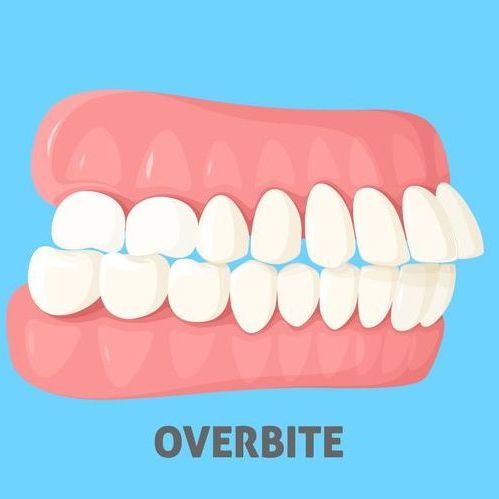
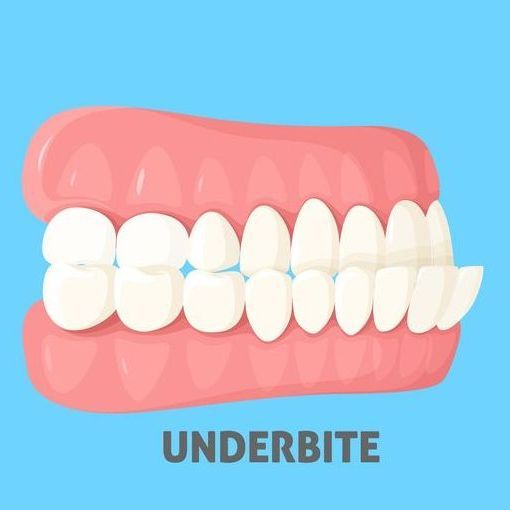
Underbite
Underbites occur when the lower row of teeth significantly overlaps the upper row. This is less common than overbites, however, the issue involves the same chewing complications, speech impediments, and jaw soreness that overbites do. In an underbite, a patient's chin is often pressed forward.
Crossbite
A crossbite occurs when the upper jaw is too narrow for the lower jaw. When this happens, the upper teeth sit inside the lower teeth. The opposite can also occur where the lower jaw may be too small for the upper jaw. Either way, a crossbite can occur on either on the left or right side of the mouth or on both sides.
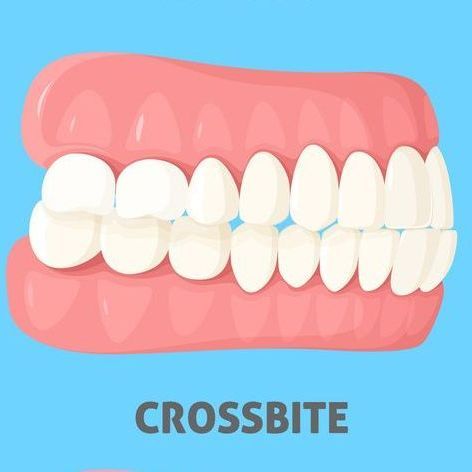
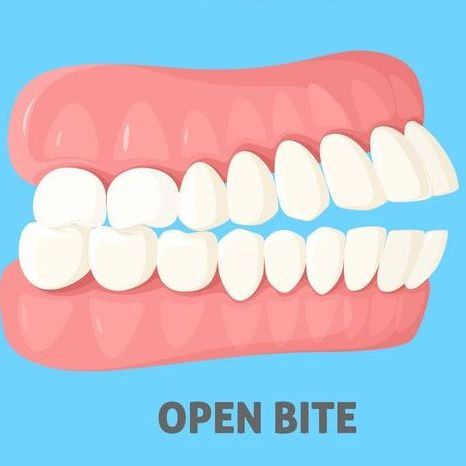
Open Bite
An open bite is when the upper and lower teeth do not touch when the mouth is at rest. This can happen on either side of the mouth but is most common with the front teeth. Open bites are quite rare. One study discovered that they are the least prevalent type of misalignment.
Crowded Teeth
In an ideal alignment of teeth, there is the right amount of space for the teeth to erupt without crowding or leaving gaps. The top teeth should hang slightly over the bottom teeth, with all the teeth lining up comfortably when biting down, however, this does not occur with dental crowding.
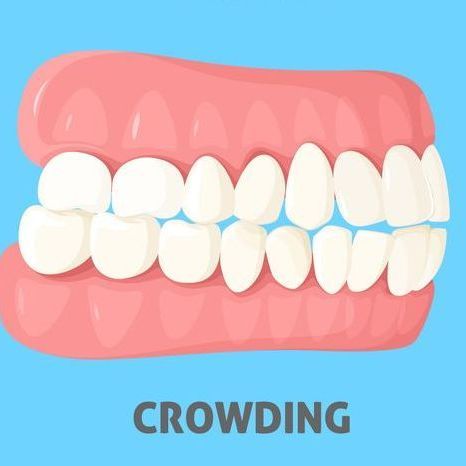
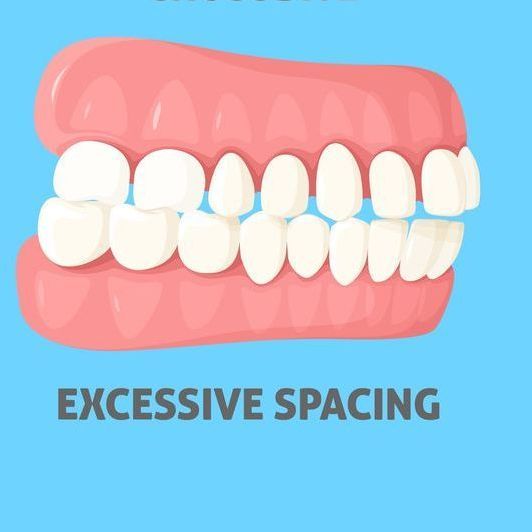
Gapped Teeth
Having gapped teeth can be the result of a size difference between your teeth and jaw, gum disease, missing teeth, or improper habits such as thumb sucking. Whether you have a small or large gap between your teeth, our orthodontist can provide insight on which treatment can close the gap.
Oral Cancer Screenings in League City, TX
Oral cancer is the 13th most commonly diagnosed cancer, according to the Dental Association. It can develop in any part of the mouth, internal or external – lips, tongue, cheeks, floor and roof of the mouth, sinuses, and throat. This is why routine checkups are so important. Routine checkups allow our dentist to thoroughly examine your mouth for early signs of development. While oral cancer is always a concern, you should know that it is rare. Unless you are actively using tobacco products, or have a gene pool that has a history of developing it, there is a very little chance you will experience anything close to oral cancer in your lifetime. However, it is never a bad idea to get your concerns checked at your next dental visit to our office. An oral cancer screening is a routine examination that is done at each dental visit. We educate our patients about the importance of following up with their medical doctor for any visual lesions, lumps, or bumps that may be observed during the screening.
The first step in screening for oral cancer is the completion of your dental and medical history, which includes a review of:
- General health history, including a list of current medications and allergies.
- Oral and lifestyle habits, with reference to quantity, frequency, and duration of tobacco use and alcohol consumption.
- Symptoms of oral pain or discomfort.
If anything is concerning, we may perform an extraoral and intraoral examination, where we:
- Inspect your head and neck for asymmetry, tenderness, or swelling.
- Palpate the submandibular, neck, and supraclavicular regions for lymph nodes, paying close attention to size, number, tenderness, and mobility.
- Inspect and palpate the lips and perioral tissues for abnormalities.
- Systematically inspect and palpate all oral soft tissues, paying close attention to the high-risk sites for the development of oral cancer including the lateral and ventral aspects of the tongue, floor of the mouth, and the soft palate complex.
Symptoms of Oral Cancer
It is important to note that while these symptoms may be caused by other, less serious oral health issues, they should still be checked by our office at your next routine visit. Common symptoms include, red or white spots or sores anywhere in the oral cavity, a sore that bleeds easily or does not heal, a lump, thickening, or rough spot, pain, tenderness, or numbness anywhere in your mouth or on your lips, or difficulty chewing, swallowing, speaking, or moving your jaw or tongue. There are many other symptoms to lookout for, so it is always best to call us for an appointment if you experience or see anything alarming.
Diagnosis and Treatment
Oral cancer screenings involve an examination of the oral cavity as a whole – not just your teeth. This helps detect cancerous and pre-cancerous conditions.
If the early stages of oral cancer are detected, it is typically treated with surgery or radiation. Advanced cases will combine surgery and radiation as the most common treatment. In the late stages, radiation and chemotherapy are the usual combination, with or without surgery.
Prevention
With all cancers, the best way to prevent oral cancer starts with you – avoid all tobacco products, only drink alcohol in moderation, maintain a healthy and balanced diet, and limit your exposure to the sun (this is significantly more important than sunblock, because sunblock can only be as effective as your ability to properly apply it, while limited exposure always works best).
There is also a link between certain types of the HPV virus and throat cancer. Avoiding risky behavior and receiving the HPV vaccine can be considered to help prevent this cancer.
Contact Us to Request a Dental Appointment!
If you’re considering dentures or need a consultation, our team at Miller Dentistry is ready to help. Call us today or request an appointment online to learn more about our custom denture solutions and find the perfect option for your smile.
